Rigoletto
Giuseppe Verdi
-
Scene 1
13 min.
-
Interval
20 min.
-
Scene 2
40 min.
-
Interval
30 min.
-
Act II
30 min.
-
Interval
20 min.
-
Act III
30 min.
Duration: ca. 3 hrs
- See photo: Rigoletto fot. / photo Krzysztof Bieliński
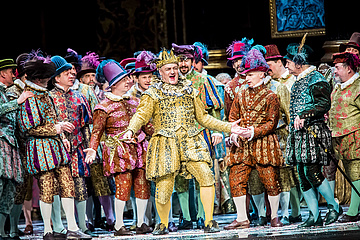
- See photo: Rigoletto fot. / photo Krzysztof Bieliński
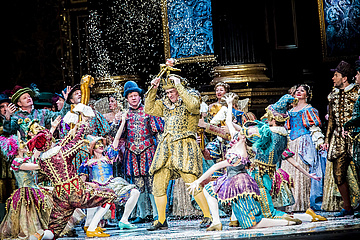
- See photo: Rigoletto fot. / photo Krzysztof Bieliński
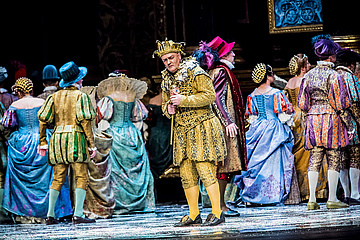
- See photo: Rigoletto fot. / photo Krzysztof Bieliński
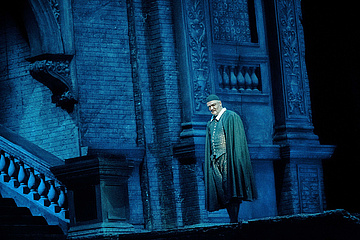
- See photo: Rigoletto fot. / photo Krzysztof Bieliński
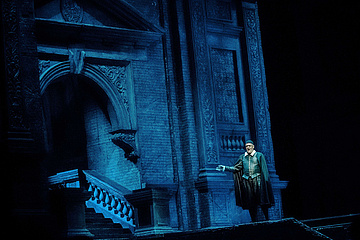
- See photo: Rigoletto fot. / photo Krzysztof Bieliński
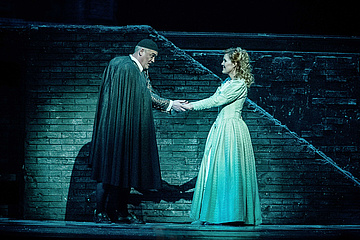
- See photo: Rigoletto fot. / photo Krzysztof Bieliński
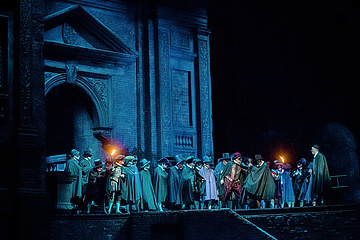
- See photo: Rigoletto fot. / photo Krzysztof Bieliński
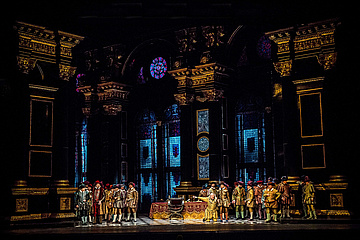
- See photo: Rigoletto fot. / photo Krzysztof Bieliński
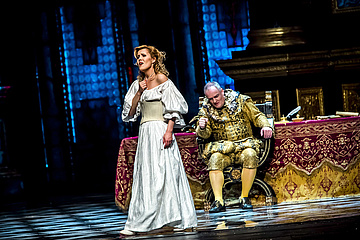
- See photo: Rigoletto fot. / photo Krzysztof Bieliński
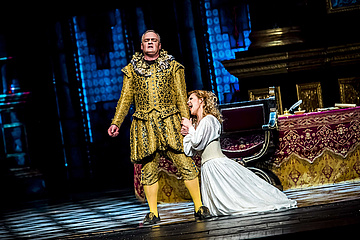
- See photo: Rigoletto fot. / photo Krzysztof Bieliński
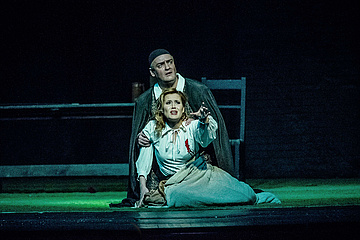
- Performance cancelled
Opera in three acts
Libretto: Francesco Maria after Victor Hugo's play Le roi s'amuse
World premiere: 11 March 1851, Gran Teatro La Fenice, Venice
Polish premiere: 8 November 1853, Teatr Wielki, Warsaw
Premiere of this production: 12 March 1997, Teatr Wielki – Polish National Opera
In the original Italian with Polish surtitles
This entire world looks real. It flickers, dazzles, delights. There are jewels, ruffs, there is a prince and a princess. And with each bar one feels like crying out after Gombrowicz: 'Here a mask torments a mask! Drop the masks!' But can a jester give up his japery? How else would he mock the courtly reality, in which honesty is dangerous? Verdi’s opera is based on Victor Hugo’s drama Le roi s’amuse. The world premiere took place in 1851 at the world capital of carnival – the Venetian Teatro la Fenice. The creative team behind the Warsaw production – the director Gilbert Deflo, set designer Ezio Frigerio and costume designer Franca Squarciapino – remain faithful to the courtly convention and construct an exciting reality. Seduced, we balance in it between what is serious and what is mockery and a jest. Rigoletto moves us with the dynamics of its imagery and the quality of its sound world. It’s an exhilarating play with a distorted mirror. It can be funny, but we sense that it’ll end up being painful. Even before the finale sounds out, one begins posing questions about the courage it takes to remove one’s mask in close relationships. Questions about a counter-proposal to cynicism and irony. About the shamefulness of feelings.
Cast
-
- Duke of Mantua
- Rigoletto
- Gilda
- Sparafucile
- Maddalena
- Marullo
-
- Borsa
- Countess Ceprano
- Giovanna
- Commander of the Guard
- A Page
- Monterone
-
- Count Ceprano
-
- Duke of Mantua
- Rigoletto
- Gilda
- Sparafucile
- Maddalena
- Marullo
-
- Borsa
- Countess Ceprano
- Giovanna
- Commander of the Guard
- A Page
- Monterone
-
- Count Ceprano
-
- Duke of Mantua
- Rigoletto
- Gilda
- Sparafucile
- Maddalena
- Marullo
-
- Borsa
- Countess Ceprano
- Giovanna
- Commander of the Guard
- A Page
- Monterone
-
- Count Ceprano
-
- Duke of Mantua
- Rigoletto
- Gilda
- Sparafucile
- Maddalena
- Marullo
-
- Borsa
- Countess Ceprano
- Giovanna
- Commander of the Guard
- A Page
- Monterone
-
- Count Ceprano
-
- Duke of Mantua
- Rigoletto
- Gilda
- Sparafucile
- Maddalena
- Marullo
-
- Borsa
- Countess Ceprano
- Giovanna
- Commander of the Guard
- A Page
- Monterone
-
- Count Ceprano
-
- Duke of Mantua
- Rigoletto
- Gilda
- Sparafucile
- Maddalena
- Marullo
-
- Borsa
- Countess Ceprano
- Giovanna
- Commander of the Guard
- A Page
- Monterone
-
- Count Ceprano
-
- Duke of Mantua
- Rigoletto
- Gilda
- Sparafucile
- Maddalena
- Marullo
-
- Borsa
- Countess Ceprano
- Giovanna
- Commander of the Guard
- A Page
- Monterone
-
- Count Ceprano
Credits
-
- Director
- Set Designer
- Costumes
- Choreography
- Lighting Designer
- Chorus Master
-
- Conductor
-
- Director
- Set Designer
- Costumes
- Choreography
- Lighting Designer
- Chorus Master
-
- Conductor
-
- Director
- Set Designer
- Costumes
- Choreography
- Lighting Designer
- Chorus Master
-
- Conductor
-
- Director
- Set Designer
- Costumes
- Choreography
- Lighting Designer
- Chorus Master
-
- Conductor
-
- Director
- Set Designer
- Costumes
- Choreography
- Lighting Designer
- Chorus Master
-
- Conductor
-
- Director
- Set Designer
- Costumes
- Choreography
- Lighting Designer
- Chorus Master
-
- Conductor
-
- Director
- Set Designer
- Costumes
- Choreography
- Lighting Designer
- Chorus Master
-
- Conductor
Synopsis
-
Act I
Strolling among the courtiers in his palace ballroom, the Duke ot Mantua lightheartedly boasts of his way with women ('Questa o quella'). After flirting with his newest quarry, the Countess Ceprano, he escorts her from the room, followed by his hunchbacked jester, Rigoletto, who openly mocks the Countess' enraged but helpless husband.A courtier named Marullo bursts in with the latest gossip: Rigoletto is suspected of keeping a young mistress in his home. The jester shortly returns with the Duke and, sure of his master's protection, continues to taunt Ceprano, who plots with others to punish him. When Monterone, an elderly nobleman, forces his way into the room to denounce the Duke for seducing his daughter, he is viciously derided by Rigoletto. As Monterone is arrested, he pronounces a father's curse on both the Duke and the jester, who falls to the floor in terror.
Late that night, brooding over Monterone's curse, Rigoletto hurries to the house where he has hidden his daughter, Gilda. On the way he encounters Sparafucile, a professional assassin, who offers his services; but the jester dismisses him, reflecting that his own tongue is as sharp as the murderer's dagger ('Pari siamo!'). His mood brightens when he is greeted by Gilda, who questions him about her long-dead mother; he nostalgically describes his wife as an angel ('Duet: Deh, non parlare'), adding that Gilda is all he has left. Afraid for the girl's safety, he warns her nurse, Giovanna, to admit no one to the house. As the jester leaves however, the Duke slips into the garden, tossing a purse to Giovanna to keep her quiet. He declares his love to Gilda (duet 'E il sol dell'anima'), who has secretly admired him at church, and tells her he is 'Gualtier Malde', a poor student. At the sound of footsteps Gilda begs him to leave; alone, she tenderly repeats his name ('Caro nome') and then goes up to bed. Meanwhile, the malicious courtiers stop Rigoletto outside his house and ask him to help abduct Ceprano's wife, who lives nearby. The jester is duped into wearing a blindfold and holding a ladder against the wall of his own house. Laughing at how they have tricked him, the courtiers break into his house and carry off Gilda. Rigoletto, hearing his daughter's cry for help, tears off his blindfold and rushes into the house: discovering only her scarf, he collapses as he remembers Monterone's curse.
-
Act II
In his palace, the Duke is distraught over the kidnapping of Gilda, whom he imagines alone and miserable ('Parmi veder le lagrime'). When his courtiers return, saying that it is they who have taken her and that she is now in his chamber, he rushes off to the conquest.
Soon Rigoletto enters, searching for Gilda; though the courtiers are astonished to learn she is not his mistress but his daughter, they bar his way. The jester lashes out at their cruelty ('Cortigiani, vil razza dannata') but ends his tirade with a plea for mercy. Just then Gilda appears, dishevelled in her nightdress; she runs in shame to her father, who orders the others to leave. Alone with Rigoletto, Gilda tells of the Duke's courtship, then of her abduction ('Tutte le feste al tempio'). As Monterone is led to the dungeons, still cursing the Duke, the jester swears vengeance. Meanwhile, the lovelorn Gilda begs her father to forgive the Duke (duet 'Si, vendetta').
-
Act III
On a dark night, Rigoletto and Gilda wait outside the abandoned inn on the outskirts of Mantua where Sparafucile and his sister Maddalena live. Gilda watches in disbelief while the Duke, disguised as a soldier and laughing at the fickleness of women ('La donna è mobile'), makes love to Maddalena. Rigoletto comforts his daughter as Maddalena leads the libertine on (quartet 'Bella figlia dell'amore'). Telling Gilda to dress as a boy, the jester sends her off to Verona, then pays Sparafucile to murder the Duke and leaves.
As a storm gathers, Gilda returns to overhear Maddalena urge her brother to spare the handsome stranger and kill Rigoletto instead. Sparafucile refuses but agrees to substitute the next guest who comes to the inn. Gilda, resolved to sacrifice herself for the Duke even though he has betrayed her, knocks at the door and is stabbed. When the storm subsides, Rigoletto returns to claim the body; he gloats over the sack Sparafucile gives him, only to hear his supposed victim singing in the distance. Frantically cutting open the sack, he finds his daughter, who dies asking his forgiveness (duet 'Lassu in cielo'). Rigoletto cries out: 'Ah, the curse!'
Sponsors
-
Mecenas Teatru Wielkiego - Opery Narodowej
-
Partnerzy Teatru Wielkiego - Opery Narodowej
-
Patroni medialni
-
Patron of Teatr Wielki – Polish National Opera
-
Partners of Teatr Wielki – Polish National Opera





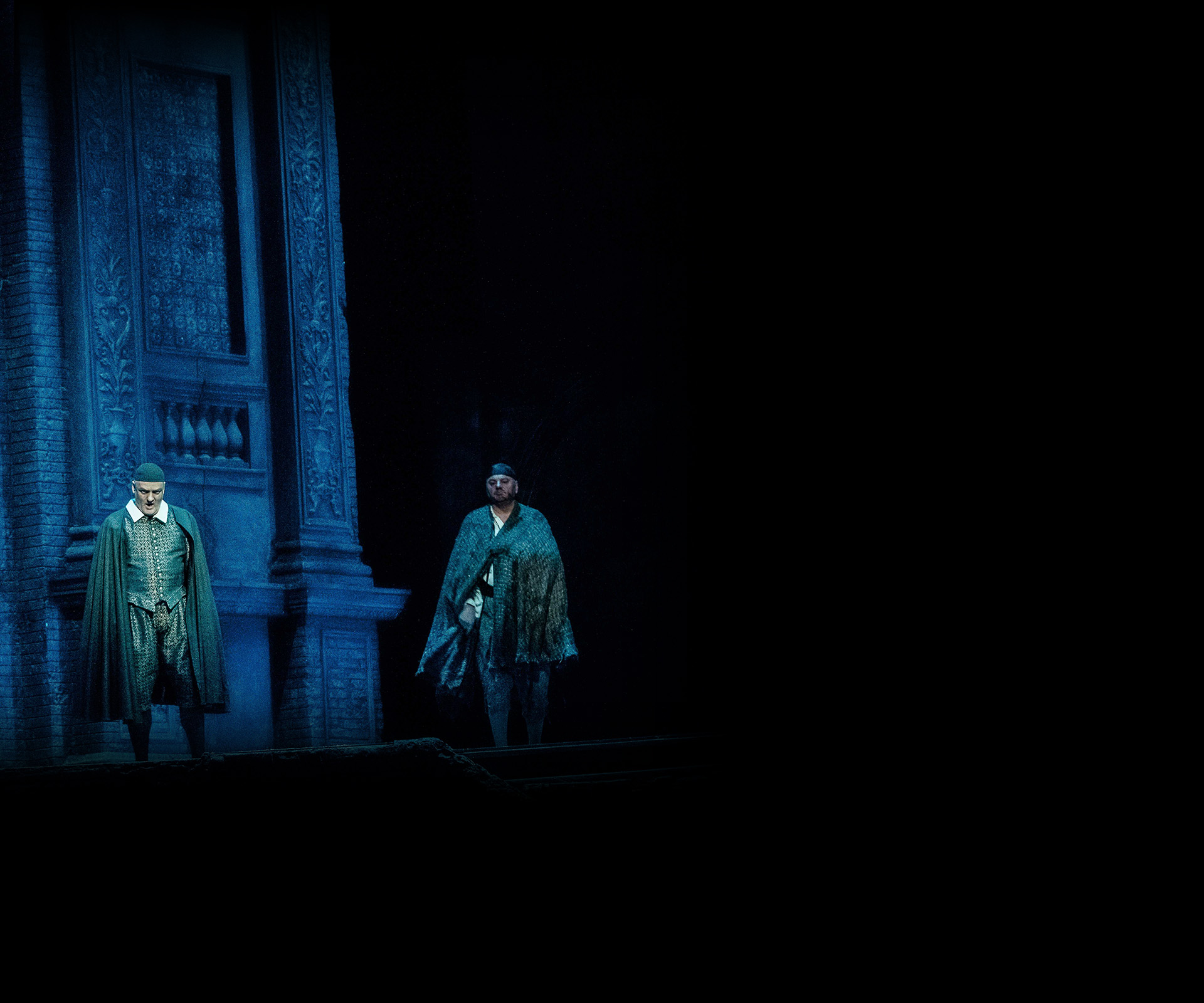
 Tadeusz Szlenkier
Tadeusz Szlenkier  Andrzej Dobber
Andrzej Dobber  Aleksandra Kubas-Kruk
Aleksandra Kubas-Kruk  Łukasz Konieczny
Łukasz Konieczny  Karolina Sikora
Karolina Sikora ![[Translate to English:]](/fileadmin/_processed_/1/8/csm_Hubert_Zapior_BIO_fot_Jan_Windszus_-_kwadrat_902a9a1276.jpg) Hubert Zapiór
Hubert Zapiór  Krzysztof Szmyt
Krzysztof Szmyt  Bożena Bujnicka
Bożena Bujnicka  Elżbieta Wróblewska
Elżbieta Wróblewska ![[Translate to English:]](/fileadmin/_processed_/5/b/csm_damian_wilma_2024_-_kwadrat_bf794b4cfc.jpg) Damian Wilma
Damian Wilma 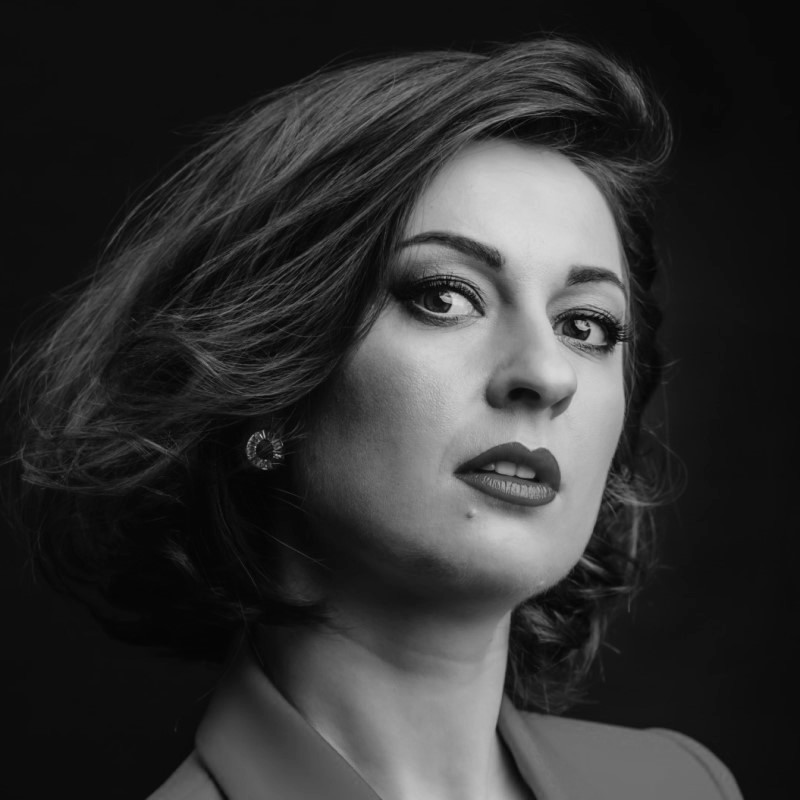 Magdalena Stefaniak
Magdalena Stefaniak  Iurie Maimescu
Iurie Maimescu  Jasin Rammal-Rykała
Jasin Rammal-Rykała  Ho-Yoon Chung
Ho-Yoon Chung  Jorge Lagunes
Jorge Lagunes  Aleksandra Olczyk
Aleksandra Olczyk  Anna Bernacka
Anna Bernacka  Piotr Maciejowski
Piotr Maciejowski ![[Translate to English:]](/fileadmin/_processed_/6/f/csm_remigiusz_lukomski_kwadrat_05aa478a8d.jpeg) Remigiusz Łukomski
Remigiusz Łukomski ![[Translate to English:]](/fileadmin/_processed_/8/d/csm_Gilberto_Deflo_kwadrat_6563b0c263.jpg) Gilberto Deflo
Gilberto Deflo ![[Translate to English:]](/fileadmin/_processed_/7/b/csm_Ezio_Frigerio_9ff667e8ae.jpg) Ezio Frigerio
Ezio Frigerio  Franca Squarciapino
Franca Squarciapino  Zofia Rudnicka
Zofia Rudnicka  Stanisław Zięba
Stanisław Zięba  Mirosław Janowski
Mirosław Janowski ![[Translate to English:]](/fileadmin/media/img/ludzie/dyrygenci/patrick_fournilier_fot_arch_artysty_-_kwadrat.jpg) Patrick Fournillier
Patrick Fournillier 




